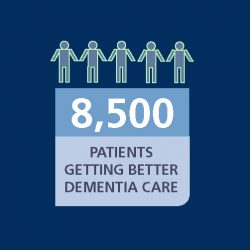‘The root and branch review you’ve done is very impressive.’
Felicity Freeman, carer advisor on Royal College of Psychiatrists’ Memory Services National Accreditation Programme (MSNAP) accreditation panel
‘This process has been a highly rewarding one, allowing us to reflect upon and enhance the quality of care that we provide. The positive feedback received from patients, carers and reviewers alike has offered welcome recognition for a dedicated, hard-working and motivated team.’
Dr Chris Ramsay, Consultant Psychiatrist, North Buckinghamshire Memory Clinic
‘When we were first considering taking our Memory Service through the MSNAP review process the prospect was somewhat daunting and overwhelming. We were extremely grateful that the Oxford AHSN was able to provide a very experienced clinician to act as an overall lead.’
Frances Finucane, Team Manager, North Buckinghamshire Memory Clinic
 Overview summary
Overview summary
The Oxford AHSN appointed a memory clinic nurse (Maureen Cundell) to enable six memory clinic teams run by two trusts in Oxfordshire, Buckinghamshire and Milton Keynes to work together to gain accreditation from the Royal College of Psychiatrists (RCP) and improve the experience of about 8,500 patients and their carers every year.
The aim was to bring all up to the standard of the best – three Berkshire memory clinics (Wokingham, Bracknell and Reading) had previously undergone accreditation, achieving ‘excellent’ ratings.
Challenge identified and actions taken
The Oxford AHSN Dementia Clinical Network aims to reduce unwarranted variation in care for dementia. The RCP Memory Services National Accreditation Programme (MSNAP) provided a structured means of working, embedding consistent high standards in memory clinics.
The Oxford AHSN Dementia Clinical Network worked with memory clinic teams in the Trusts to help them evidence standards and identify any standards not currently met. This process resulted in cross-fertilisation of ideas and sharing of protocols, encouraging mutual support and a ‘learning cascade’.
A key element of networking for the clinics was meetings arranged by Maureen Cundell, where clinical staff from these six services visited each other acting as ‘mock’ peer reviewers, in preparation for external peer review. This process not only helped services to rehearse their peer review answers but also resulted in cross-fertilisation of ideas and sharing of protocols and learning.
The Oxford AHSN Dementia Clinical Network, in funding Maureen’s time and building the network, was key to generating this collaborative working and sharing, and encouraging the learning and mutual support between clinics to improve the patient and carer experience.
Outcomes
- All 12 memory clinics in the Oxford AHSN region achieved accreditation by January 2017.
- Improvements have been embedded into services.
- There has been significant improvement in policies and procedures within clinics as a result of working towards accreditation.
- One of the most significant areas addressed is patient and carer experience. It has been very rewarding for the teams to receive positive feedback from service users, and improvements in the physical environment have been made following carer feedback.
- Other benefits included improved multi-disciplinary and inter-agency working and a new website for memory services.
- Ideas have been developed for using resources more efficiently eg. more nurse assessment in GP surgeries.
Plans for the future
Future plans will be guided by feedback from the RCP MSNAP team regarding accreditation. Accreditation lasts two years so the process is ongoing with Wokingham undergoing re-accreditation with others to follow. Oxford AHSN work will focus on ensuring improvements are embedded into services.
Contact for further information
Fran Butler, Dementia Clinical Network Manager, Oxford Academic Health Science Network, Magdalen Centre North, Robert Robinson Avenue, Oxford Science Park, OX4 4GA fran.butler@dementia.oxfordahsn.org
AHSN core objectives
A – Promote health equality and best practice
B – Speed up adoption of innovation into practice to improve clinical outcomes
C – Build a culture of partnership and collaboration
Clinical priority or enabling theme/s
1 – Reducing premature mortality
2 – Enhancing quality of life for people with long term conditions
4 – Positive experience of treatment and care
5 – Treating people in a safe environment and protecting them from avoidable harm

